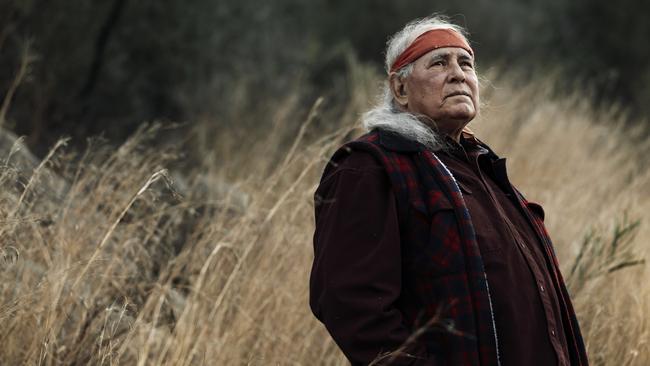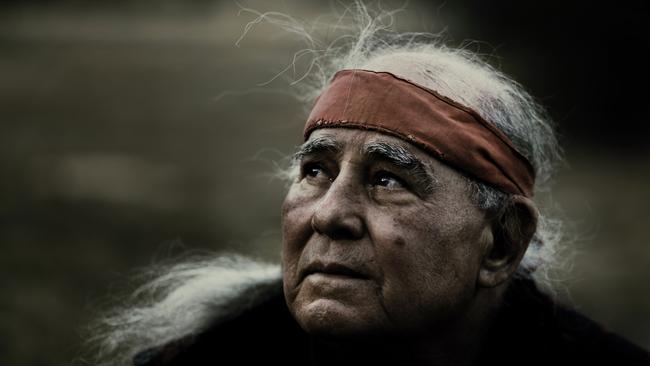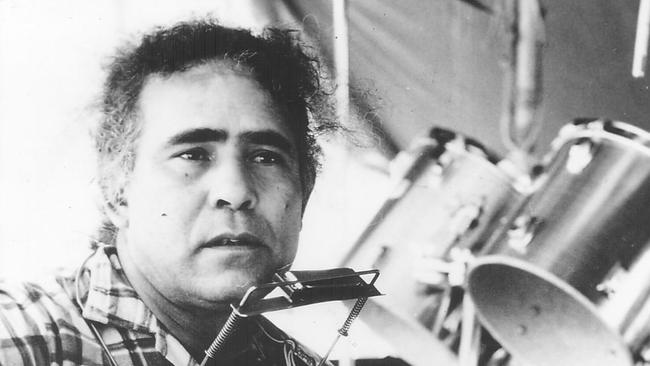All hail Kev Carmody, king of country
His world is centred on his beloved patch of bush in Queensland’s Granite Belt. But Kev Carmody’s influence on Australian music spreads far and wide.

It’s a cool Thursday afternoon on the back roads of Stanthorpe, on the Granite Belt just inside the Queensland border, and Kev Carmody is having trouble clicking in his seatbelt. The car is filled with Kev, in his checked winter coat and with a beanie low on his forehead, guitars in the back, and a pot of pea and ham soup lovingly made by his partner of 33 years, Beryl. We’ve been yarning all day – so much so that we didn’t have time to eat the soup – and despite three spinal operations and his debilitating arthritis, Kev, 74, a colossus in Indigenous music, or for that matter any music produced in this country in the last half century, finally gets the belt secure.
And just as well. On the short drive to his home, outside the town of Ballandean south of Stanthorpe, he continues, as he has done all day, with his wondrous, sometimes raucous, sometimes quiet, sometimes painfully moving, sometimes hilarious, monologues. It’s a verbally boisterous and bumpy ride back to Kev’s joint. He has quite a motor, this big, bull-chested man, his grey hair held in a loose ponytail, and as we navigate through his community he issues a delirious, non-stop stream of observations about life, nature, tomatoes, his neighbours, granite formations, flowers, his chops as a songwriter, Indigenous Australians, injustice, unfairness, the birth of ballads and the death of friends.
“Here,” Kev points towards the passing bush. “This is where the fella who made the banjos, his block is… no, not that one… this one, this is the carpenter who makes the banjos with the hubcaps… he has a beautiful place up in there,” says Kev, his eyes scanning the horizon, absorbing everything, his words barely able to keep up with his thoughts. “And it was down here, at 4 o’clock in the morning, that poor old Rex hit the bloody roo on his motorbike. He said you can’t believe it, the bike’s bloody following me down the road and the bloody kangaroo’s off in the paddock.”
He has a laugh big enough to rattle the lid off the soup pot. Then it’s back to talking about his beloved music. “I’ve always been into the concept of ‘don’t make it too pretty’,” he says. “If it can be done on an acoustic guitar, keep it there. Anyone can get onto an electric guitar and sound like Eric Clapton, you’ve got wah-wah pedals and Christ knows what, but try doing it just on your acoustic. Be sparse with it.” Pure? “Yeah, yeah.”
How do you rate yourself as a songwriter? “On a scale of one to 10? I’d be minus eight, because I’m thinking in a different mindset.”
And then: “Hang on, what’s he doing here? This is what happens when you drive around the country. What’s he got this great big bloody excavator there for? This all used to be fruit trees. They pulled all the fruit trees out, all the bloody nectarines and plums and apples and that, and put bloody tomatoes in, because there’s money in tomatoes.” He misses nothing. A murder of crows attracts his curiosity. A missing street sign. A smudge of fire across the low hills.
Kev’s story is that of the First Nations people. He embodies it. He worked shovelling wheat and welding steel and had a whole life rich with joy and tragedy before he recorded a note of music. And here he is, folk titan, storyteller, national treasure, poet, academic, Uncle, totemic Elder, father, grandfather, seer, and all that hard work, all that beauty he has given and will leave behind, has come back to this remote corner of the world and is about to sit at his feet and honour him.
Next week, his most important songs will be rereleased on the album Cannot Buy My Soul, along with a companion suite of those same songs reinterpreted by friends and older names – Jimmy Barnes, Kasey Chambers – and the stars of a new generation; Courtney Barnett, Kate Miller-Heidke.
All hail King Carmody. But at this moment, staring through the windshield, he is interested in wattle trees. “See all the bloody yellow wattle up there, on the western side where the sun gets it, yet over on these hills here you can hardly see a yellow one. It’s all on that hill,” he says. “And look at the beauty of that. Wow! Those mountains, you can look out at that and if you keep going you can… go right out into the universe.”

It’s earlier in the day and Kev is sitting at the kitchen bench in his home, a stone’s throw from three waterholes and surrounded by four tracts of untouchable nature – Girraween National Park, Horan’s Gorge Nature Refuge, Sundown National Park and Donnybrook Nature Reserve – and talks about the road to this place, with its view of yellow wattle flowers from the front deck.
He was born in Cairns to an Irishman, Francis John Carmody (or Jack, as he was known), and an Indigenous mother, Bonny. They met in Brisbane where Jack, who had joined the Army during World War II, was based. He was training as one of Australia’s first paratroopers. (His mates called him “Bull” Carmody for his imposing size and strength.) They married in Far North Queensland. Kev says: “It was illegal for them to get married, for a black to marry a white at that time in Queensland under law. But they went up to Cairns because it was a lot easier there, because there were other Indigenous people, they were all working in the cane fields.” In 1950 the family headed south and settled near Tara on the Darling Downs, about 300km west of Brisbane. Kev was four years old and remembers it like it was yesterday. “I used to help haul the cattle on my little horse while the men mustered in on the stations,” he says. They were some of the happiest years of young Kev’s life. Especially at night, under the stars.
“Well, the thing was, Dad got some money, he bought an old dry cell battery wireless. We’ve still got it in the old hut,” he says. “Then you run an aerial up high to get your signal. It had mid-wave, short-wave, and then the local ones. At night-time you could turn the knob and get all around the world depending on the atmosphere and stuff. You could pick up Moscow, all these different languages, you’d hear Beethoven.”
They heard Under Milk Wood, the radio drama written by poet Dylan Thomas and produced by the BBC in 1954. In the morning, on the ABC, they’d get what was called Hillbillies. “So we heard Tex Morton, we heard Hank Williams, we heard Buddy Williams. You name it. The Australian fellows, there were just heaps of them, and a lot of American stuff.” Did you feel it had an impact on you then? “Oh, Christ yes. What intrigued me was the fact that you could hear Robert Johnson, or you could hear Blind Willie McTell. They’re using four fingers. These old fellows, they’ve got the bass, the rhythm, and the lead in the one hit! Don’t need a band. Shit, that’s good.”
He was also hugely attracted to classical music. “The combination of music theory with the symphony orchestras, how the oboe counteracted with the cello… it was just fascinating to me, the beauty and the emotive feel of that music,” he says. “It moves the spirit.” He never forgot what his Indigenous grandfather from north Queensland, Frank Balser, told him. Listen to the wind, he said. Be aware of things around you. Use your imagination and widen it out. Learn to listen in another way. That’s the essential key to music.
He was told that the space between the stars was the most important. That’s where the stories were. But when Kev was 10 years old, the outside world intruded on his idyll. His parents were given an ultimatum. Kev and his younger brother Laurie had to go to school and get an education or be “taken away”. “We always thought it was a joke when we were little kids,” he says. “We were told, whenever you heard a vehicle you ran and hid. If some bugger come, ‘Piss off!’ And we weren’t allowed to come out unless one of the rellies come and got us. But then what I realised when I was about 18 or 20 was that they were hiding us from the authorities by moving us around.”
He and his brother were sent to a boarding school in Toowoomba, up on the Great Dividing Range west of Brisbane. “That’s where we wound up, and I did learn to read and write,” Kev says. “But the thing is, I was a big kid put into the lowest grade, so I was automatically told I was a black dumb bastard, and I was the dunce of the class.
“I had that oral history training, so I remembered pretty quick when I saw that picture, ‘The cat sat on the mat.’ I didn’t know what the words were, but I could remember what was said by looking at the picture. But I did learn to read and write, and I was pretty good at sport.”
He then attended Downlands College, the prestigious Catholic boarding school in Toowoomba. It was serious about its rugby, and Kev made the First XV playing with boys years his senior. But in the end it wasn’t for him. He didn’t finish high school. It was the early 1960s, and Kev returned to working the drover’s camps. “On the drover camps you’d pass these dumps, local dumps,” he remembers. “People just dumped their things in the river, or they dumped them in the gullies and that, but we found… we used to call them open air supermarkets. We’d get nails, we’d get bolts, we’d get nuts. We’d get sheets of iron, we’d get wire.
“I found a book and it said, ‘Teach yourself guitar’, not, ‘I’m going to teach you, mate’. No, you teach yourself how to play the guitar! Oh shit, OK. But she was wet. I don’t want to lose a page… might be the most important page of how you can teach yourself. No bastard’s going to teach you, you teach yourself. But I dried her out round the fire.”

It’s close to midday and we find ourselves in one of the most unlikely music recording facilities in Australia. In the low hills outside Stanthorpe – famed for its stone fruits and wine grapes – is Tuxedo Junction Studios, a massive space that, at first sight, resembles some funky alternative music nightclub in the back alley of a major capital city, but frozen in the 1980s. It has a red cash register at the entrance, racks of CDs and shelves heaving with vintage knick-knacks. The walls are papered with original posters for concerts by Siouxsie and the Banshees, The Cure, Hoodoo Gurus, Echo & the Bunnymen and Jane’s Addiction. There are speakers and drum kits and guitars galore. And while it is a bone fide recording studio, it looks like a giant country shed. Which it is. Or was. A former apple packing shed, its walls stuffed with ancient insulation for the millions of pieces of fruit (and chilled-to-the-bone packers) that once passed through this place. The studio is the brainchild of Andy Wilmott, sound engineer, musician, teacher and former drummer for the mid-’80s Brisbane alternative band Thanks for the Fish, who returned to his home town after a serious illness years ago. He is great friends with Kev, and they work on music together in the converted studio.
Meanwhile, Beryl (who met Kev when they were students at the University of Queensland in the 1980s) has put on a sumptuous spread of roast chicken, bean salad, olives, relish, cake (and the soup), and Kev talks about the unlikely origins of his music career, given he didn’t start recording until he was in his 40s, but carried hundreds of songs with him, in his memory and imagination, since he first taught himself to play guitar.
Before the music, though, Kev had some catching up to do. In the late 1970s he enrolled in courses at the Darling Downs Institute of Advanced Education (later the University of Southern Queensland), where one of his tutors was the great Australian poet Bruce Dawe. Kev studied music, too, before completing a Bachelor of Arts degree and postgraduate studies at the University of Queensland (UQ) in Brisbane. He also began a PhD in Australian history, focusing on the “colonial mentalities” of the Darling Down region, near where he and his family spent their droving years.
Kev loved study. Adored poring through books and research material and primary historical documents. Then music caught him by surprise. One of the first songs he recorded was his early classic I’ve Been Moved. It goes in part: I’ve been moved/ By the crying of the newborn/ And the sweetness of the air in the spring. I’ve watched the moonlight flood/ Across them sleepy hills and valleys/ Heard the sadness in a requiem. “I had no concept of ever recording it with a company or anything,” he says. “But what happened was the birth of community radio stations. That was just such a godsend to us blackfellas. And yeah, the community radio stations really, really made a difference, because I used to just walk down to Triple Z radio station at UQ and say, ‘Oh, shit. I just wrote this song.’ ” He’d play his new music straight down the line on The Murri Hour. Other songs poured out of him. Thou Shalt Not Steal, Comrade Jesus Christ, Black Deaths in Custody and Black Bess. Still, he never saw it as a future career. “No, shit, couldn’t give a stuff,” he says. “Went back home. I was over 40 years old. Christ, I couldn’t give a stuff.”
In 1988, he recorded his debut album Pillars of Society. He was 42. Revered music critic Bruce Elder described it as “the best album ever released by an Aboriginal musician and arguably the best protest album ever made in Australia”. That did the trick. “Holy shit, next thing there’s people trying to ring me up and contact me, and I haven’t got a phone because the coppers have got mine all tapped in Queensland,” Kev laughs. Other albums followed. As did a little ballad he co-wrote with the great Australian singer-songwriter Paul Kelly, From Little Things Big Things Grow.
All this, and yet the one thing constantly on his mind was to get back to the Queensland scrub of his boyhood. “There’s nothing like the campfire, a bit of cooking, a bit of fishing in the creek, conversation… watching the moon,” Kev told a reporter just as his career was taking off.
Next Friday, EMI Music Australia will release Cannot Buy My Soul, a double album of original Carmody songs and those same songs reinterpreted by some of this country’s most respected performers. It was first released in 2007, but the new version has been refreshed and contains several additional contemporary performances. (It will also be available on vinyl and streaming platforms.) The stellar roll call honouring Kev’s work includes Paul Kelly, Courtney Barnett, Archie Roach, Bernard Fanning, John Butler, Steve Kilbey, Kate Miller-Heidke, Alice Skye, Kasey Chambers, Jimmy Barnes, Troy Cassar-Daley, Missy Higgins, Augie March, Electric Fields and others. It is not just a simple tribute album. It is a showcase of Kev’s enduring power as a songwriter and performer, and in the great tradition of Indigenous storytelling, a passing on of his songs to younger generations and beyond.
“They’re emotional songs, they’re powerful, they combine politics and poetry… some songs are hymns, others are strong polemicals, other songs combine all those things,” says Paul Kelly, who features on several tracks. “The other thing that is notable is how relevant a record like this is, as it was in 2007, as it was when he was first writing those songs in the 1980s. His songs have not dated. They’ve become more and more pertinent. His work has been sort of beating the ground for a long time. He’s been an influence on so many up and coming songwriters, both Indigenous and not.”

Archie Roach sings the title track. “It’s a story. The way the song speaks of Aboriginal Australia, you’re thinking of a person’s spirit, a person’s soul, which is indomitable, it cannot be bought or sold, it cannot be broken, or oppressed. The song to me is a spiritual song, so I approached it like that,” he says. Kate Miller-Heidke contributed a moving rendition of Blood Red Rose. “The songs speak for themselves,” Miller-Heidke says. “He’s a national treasure. And I’m sure this record will lead to a wider audience digging into his back catalogue, because the rewards are there.”
Project producer Sian Darling emphasises the timeliness and relevance of Kev’s work. “Uncle Kev is a first-hand witness to a black person’s experience in Australia,” Darling says. “Australia is a beautiful country but it’s been built on racist foundations and Kev bears witness to that.”
Head of EMI Music John O’Donnell says the songs on Cannot Buy My Soul should be put in front of both black and white Australians. “I do think this work, and Kev’s words, his songs, need to be spread as far as they can be spread, these are history lessons… that sounds a little corny but they are living histories that need to be retold and not forgotten,” O’Donnell says. “Many of the stories around black deaths in custody, around the Stolen Generations, these things all happened in my lifetime and it’s quite gobsmacking to think that not that long ago Indigenous children were taken away from their parents, that we’re still living in an era when black deaths in custody is still an issue, is still a problem.
“And then there are incredible love songs too… I think it’s a great mix of all of these elements that make him the artist and the songwriter that he is.”
It’s late afternoon and Kev is sitting on his backporch looking up the hill behind his house. The pea and ham soup has been returned to the Carmody kitchen from Tuxedo Junction without the loss of a drop, and will probably be reheated for dinner. The domestics aside, is he happy with his life? He has an honorary doctorate. He has been inducted into the ARIA Hall of Fame. He has been garlanded with plaudits and awards.
Kev smiles. “I am,” he says, followed by a long pause. “But how happy do we get when we’ve got all this… still got the bloody deaths in custody and no bastard has been bloody charged, for Christ’s sake. You’re happy to a point but all this has got to be bloody addressed. Historically, we’ve really got to be truthful about what happened. It was a bloody invasion. Let’s get used to that idea. And it’s not a blame game. It’s just saying, this has to be bloody well discussed. Even here, if you look over here to the west, there was a bloody massacre here on the station. All the great explorers… they were economic outriders for the bloody stock exchange.” This is the voice of his debut album Pillars of Society all those years ago. Still strong. Unbending. Unyielding. Truths tempered by fire over the decades. It is his lived history.
Sometimes you catch the amiable Kev looking into the middle distance, his skin flawless and ruddy pink in the cold, and for the briefest of moments see a deep sadness about his eyes. He’s been reading the Bible. “When you look at the Bible and the concept of Christianity,” he says. “The three Cs – colonialism, Christianity and capitalism. They’re all bound together. How can you discover something that’s already bloody there for Christ’s sake? We walked around here naked for 65,000 years…”
As we drive off at dusk, you can just make out Kev and Beryl waving farewell from their front veranda. Kev. Still with big, important things to say. Son of Bonny and Bull Carmody. He fails to get smaller the further the car moves away.
In his song Eulogy for a Black Person, he writes: “Make no monuments or mortal crowns/ Or speak my name again when you lay me down.” Does he think he and his songs will be remembered? “People are still listening to Beethoven,” he says. “I’m not Beethoven. But I don’t know, I just don’t know. Pass on your stories? Jeez, I hope so.”
Then we lose sight of the Carmodys, just past the ridge of yellow wattle flowers, where you can look out, and if you keep going you can go right out into the universe.

To join the conversation, please log in. Don't have an account? Register
Join the conversation, you are commenting as Logout